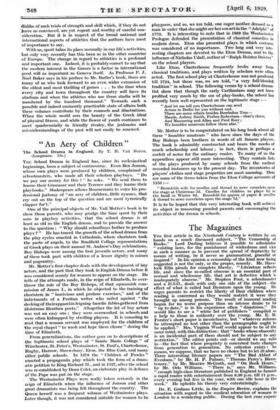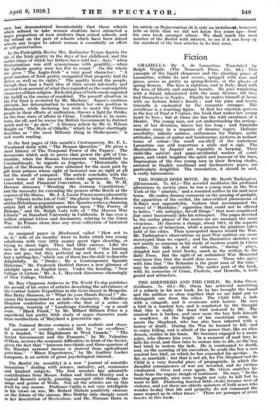The Magazines
THE first article in the Nineteenth Century is written by six hands on a much discussed subject, " The Censorship of Books." Lord Darling believes it possible to administer existing laws, for the punishment of wickedness and vice in such a manner as to prevent the spread of depravity by means of writing, be it never so grammatical, graceful or inspired." In his opinion a censorship of the kind now being suggested is not the only, or the proper, remedy. Mr. Have- lock Ellis pleads for complete liberty. " Literature reflects life, and since the so-called obscene is an essential part of normal and wholesome life, that art is defective which is inadequately obscene." Mr. Stephen Foot, a schoolmaster and a D.S.O., deals with only one side of the subject—the effect of what is called bad literature upon the young. He urges parents to restrict the liberty of their children where reading is concerned as they would restrict it were they brought up among poisons. The result of immoral reading begun for no worse purpose than an intense desire to be up to date," is in his experience often " disastrous." He would like to see a " white list of publishers " compiled as a help to those in authority over the young. Mr. E. M. Forster's short paper is inconclusive, but " whatever reforms be attempted no test other than the pornographic ought to be applied." Mrs. Virginia Woolf would appear to be of the same mind, with this distinction: that "books whose obscenity is an incidental part of them should not be subject to any restriction." The editor points out—or should we say rubs in—the fact that where propriety is concerned taste changes from generation to generation. No criterion exists : he means, we suppose, that we have no choice but to let ill alone. Three interesting literary papers are " The Bad Abbot of Evesham," by Mr. H. P. Palmer, ".Thomas Percy's Bicen- tenary," by Mr. Maurice McGrath, and " On Book Hours," by Mr. Orb Williams. " There is," says Mr. Williams, " enough high-class literature published in England to furnish a rapid reader with entertainment froni 8.30 p.m. till 11 p.m., every evening but five in the year, with one idle hour in the week." He upholds his theory very entertainingly.
Dr. E. Graham Little, in the Empire Review, explains the situation with regard to the medical education of women in 'London to a wondering public. During the last year experi- ewe has demonstrated incontestably that those schools which refused to take women students have attracted a larger proportion of men students than mixed schools, and the refusal on the part of schools which have been mixed schools any longer to admit women is essentially an effort at self-preservation.
In thePortnightly Review Mrs. Katharine Tynan depicts the life of the Irish gentry in the days of her childhood, and the earlier times of which her fathers have told her ; days " when Protestantism was still synonymous with gentility,—when the Catholic gentry were too few to count." On the whole she gives " The Anglo-Irish " a very good character : " A great number of Irish gentry recognized that property had its duties as well as its rights. The quality loved the people, though they had a fixed idea of their moral inferiority and excused it on account of what they regarded as the contemptible character oftheir religion. Rich and poor of both creeds regarded the bailiff as the enemy of mankind. The present situation in the Far East is reviewed by Mr. Machray. Japan's cautious attitude, her deterthination to maintain her own position in Manchuria, while declaring her wish to assist the Chinese people in their efforts at unification, throws a lightrne thinks, on the true state of affairs'in China. Unification is, he main- tains, far off, and he warns the British Government to distrust words and to " go slow." A literary article by Mr. G. Wilson Knight on "The Style of Othello," which he rather startlingly describes as " the most Miltonic thing in Shakespeare,' is well worth reading.
In the first pages of this month's Contemporary, Mr. E. L. Woodward deals with " The Roman Question." He gives a short history of The Temporal Power of the Papacy. The documents which seek to prove that power the gift of Con- stantine, when the Roman Government was transferred to Constantinople, he regards as forgeries. " Historically the lands of the Roman See were obtained for the most part by gift from princes whose right of bestowal was no right at all but the result of conquest. The article concludes with the exact terms of the present three-fold agreement, Treaty, Concordat, and Financial Convention, as it is. Mr. W. H. Dawson discusses " Mending the German Constitution," and the necessity for extending the powers of the Reich at the expenseof the States. Mr. J. A. Lovat Fraser muses pleasantly upon "Ghosts in the Isle of Coll," the ghosts being Dr. Johnson and his Hebridean acquaintance. Mrs. Spender writes a charming article full of delightful quotations upon " The Poetry of Bishops," and Dr. Ralph Lutz tells of " The Hoover War Library" at Stamford University in California. It has over a million original letters and documents, relating to the Great War. In France alone does any rival collection of historical material exist.
An unsigned paper in Blackwood, called " How not to do it,". tells of six _months' leave in India which two young subalterns with very little money spent tiger shooting, or trying to shoot • tiger. They had little success. Like the men in the ancient rhyme, they found that " this hunting does not pay, but they pottered up and down a bit and had a rattling day," which one of them has the skill to describe delightfully. In " Drake : By a Contemporary Spanish Historian," Mr. Frederick Harford throws a new glimmer of sidelight upon an English hero. Under the heading, " New College et Cfetera,' Mr. A. L. Maycock discourses charmingly of New College, Oxford.
Mr. Roy Chapman Andrews in The World To-day publishes the second of his series of articles describing the adventures of the Central Asiatic Expedition in the Gobi Desert in Mongolia. Miss Betty Shannon, in What do your Hands Reveal ? " dis- cusses the human hand as an index to character. Mr. Geoffrey Henslow contributei an article—the first of a series—on gardening, treating of " Landscape Gardening " on a small scale. " Black Frank," by Mr. Millard Milburn Price is a superficial but pretty little 'study of negro character made from recollections of Maryland a generation ago.
The National Review contains a most realistic and cheer- ful account of country colonial life by " an ex-officer." It is headed, "'An Englishman in West Canada." " The Soviet Government and the Peasants," by Mr. Valentine O'Hara, reviews the economic difficulties in front of the Soviet, given the fact that " between two-thirds and three-quarters of the Russian national income is derived from agricultural activities." " Minor Experiences," by Mr. Godfrey Locker Lampson, is an article of great psychological interest.
The Realist (2s. monthly) is a new " journal of scientific humanism " dealing with science, industry, art, economics and kindred subjects. The first number has admirable contributions from Messrs. Julian and Aldous Huxley and a typical Bennett article, praising, amongst other things, the range and genius of Wells. Not all the articles are on this level by any means. Professor Catlin is not very intelligible in his views on war, Mr. Robert Nichols positively obscure on the future of the cinema, Miss Hoftby only cheaply smart in her description of Revivalism. and Dr. • Norman Haire in his article on Rejuvenation (it is only an instalment, however) tells us little that we did not know five years ago—front his own book amongst others. We shall reach the next number of the Realist with interest, to see if it can keep up the standard of the best articles in its first issue.







































 Previous page
Previous page